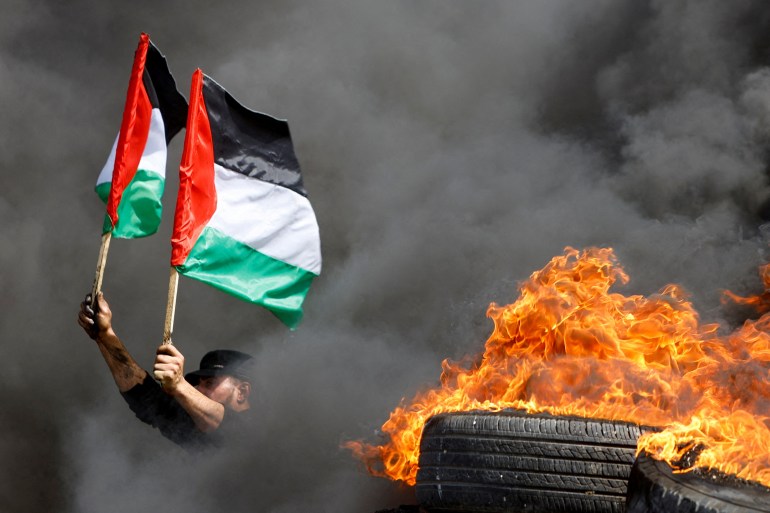Israeli forces attack Palestinians in Al-Aqsa for second time
International concern rises after Israeli police fire rubber bullets at Palestinian worshippers in a second raid on the Al-Aqsa Mosque compound.

Israeli forces stormed Al-Aqsa Mosque during Ramadan evening prayers for a second consecutive night, firing rubber bullets and stun grenades at hundreds of Palestinian worshippers.
Police entered the compound in Jerusalem late Wednesday night, using stun grenades and rubber bullets to force people to leave, according to the Islamic Waqf, the Jordanian-appointed organisation managing the third-holiest site in Islam. The Palestinian Red Crescent said six people were wounded.
Keep reading
list of 4 itemsHear from the Palestinians attacked in Israel’s raid on Al-Aqsa
Photos: Israeli forces carry out violent raid at Al-Aqsa Mosque
Israel attacks Gaza after Al-Aqsa Mosque raid
The two raids drew heavy criticism from various leaders and organisations across the world with the United Nations Security Council set to meet for a closed-door session to discuss the continued Israeli raids on Palestinian worshippers in the Al-Aqsa Mosque compound in occupied East Jerusalem.
Following the raid on Wednesday night, a teenage Palestinian was shot in the arm by an Israeli settler in occupied East Jerusalem and Israeli forces used force on protesting Palestinians in the occupied West Bank.
Palestinian news agency Wafa reported violence in Nablus and near the cities of Hebron, Jenin and Bethlehem.
At least one person was wounded by live ammunition in the town of Beit Ummar near Hebron, while dozens were hurt when they inhaled poisonous gas fired by Israeli forces, it said.
The Israeli police blamed the two raids on “dozens of young people” who allegedly brought rocks and firecrackers into the mosque and tried to barricade themselves inside.
The Waqf said police entered the mosque before prayers were over. Witnesses said worshippers threw objects at police to keep them away.
Palestinian envoy to the UN Riyad Mansour condemned the raid, saying Israel has “no right whatsoever to tell people when to pray and when not to pray” at Al-Aqsa.
He noted that only Palestinian Muslims could practise their religion there, referring to a longstanding “status quo” arrangement governing the compound that states that non-Muslims can only visit the compound.
The complex is also Judaism’s most sacred site, revered as Temple Mount, a vestige of the two biblical Jewish temples. More Jewish visitors are trying to pray at the compound despite the arrangement, and despite it being forbidden by Israel’s main ultra-Orthodox rabbinates.
A night earlier, a similar raid saw the arrest of more than 400 people.

Violence spreads to occupied West Bank, Gaza
Reporting from occupied East Jerusalem, Al Jazeera’s Natasha Ghoneim said that after the first assault on Al-Aqsa, Palestinian groups, including Hamas – which governs the blockaded Gaza Strip – called on Muslims to defend the compound “from occupiers”.
“The reason this call was going out was that Wednesday was Passover for Jews and there was expected, during visiting hours to be a greater number of Jews visiting the Al-Aqsa compound,” she said.
These visits, she added, were a “very hot-button issue” for Palestinians.
“The Jews that tend to go into the compound are nationalists. They possess a very conservative ideology. They are prohibited from praying inside the compound but we know that that ban has been violated on numerous occasions and that, again, is a real provocation to not only Muslims but all Palestinians,” she said.

On Wednesday, after the first raid, nine rockets were fired towards Israel from the Gaza Strip, after which the Israeli military launched air attacks on the blockaded coastal enclave, hitting what it said were weapon production sites for the Hamas group.
Later that night, Palestinian groups fired two rockets from the Gaza Strip into Israel and thousands of people rallied near the separation barrier between the besieged enclave and Israel to protest. The Israeli military said one of the rockets fell short and the other in an open space.
Hamas did not claim responsibility for the rockets but said they were a response to the raid on Al-Aqsa, where clashes in 2021 were followed by an 11-day Israeli offensive on Gaza.
No casualties were reported in either Gaza or Israel.
Israeli Prime Minister Benjamin Netanyahu said the country was working to “calm tensions”. He blamed the situation on “extremists” who barricaded themselves inside the mosque.
Calls for calm
The violence has raised fears of a wider conflagration.
“Leaders on all sides must act responsibly and refrain from steps that could escalate tensions,” said the UN special coordinator for the Middle East peace process, Tor Wennesland.
The Arab League held an emergency meeting on Wednesday, after which it condemned the raid and said it endangered regional stability.
Egypt and Jordan, both involved in the US-backed efforts to de-escalate the tensions, condemned the incident, as did Turkey. Saudi Arabia, with which Israel hopes to normalise ties, said Israel’s storming of Al-Aqsa undermined peace efforts.
Nabil Abu Rudeineh, spokesman for Palestinian Authority President Mahmoud Abbas, said the violence was an affront to efforts to calm tensions.
With Israel still reeling from weeks of protests over Netanyahu’s plans to curb the powers of the Supreme Court, the violence adds to a fevered political atmosphere.
Far-right National Security Minister Itamar Ben-Gvir called for a harsh response. “It’s time to rip heads off in Gaza,” he said in a tweet.
Violence has surged in the occupied territory over the last year as the Israeli military carried out near-nightly raids on Palestinian cities, towns and villages.